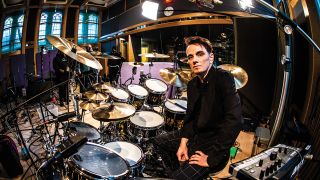In 2021 the near unthinkable happened when Porcupine Tree announced they were reforming for a new album and tour. Needless to say, Prog caught up with the trio to discuss the story behind their big comeback album, 2022's Closure/Continuation, and find out whether this really is the end of Porcupine Tree’s 30-year career, or just a new chapter.
It’s often said that all good things come to those who wait, but surely nobody was expecting a new Porcupine Tree album. When the UK prog crew released a brand-new song, Harridan, last November (their first new music in well over a decade), prog-friendly corners of internet came close to having a shared emotional meltdown. Long before progressive music had any kind of critical or cultural recovery, Steven Wilson’s band were slaving away in the pursuit of a more interesting, creative and forward-thinking approach to artful rock. From the beginnings as a cod-psychedelic DIY project that only really existed in Wilson’s bedroom, to the esoteric, prog-embracing experiments of Voyage 34 and The Sky Moves Sideways, and on to the holistic modern prog magnificence of certified classic albums such as In Absentia, Porcupine Tree have always been essential listening for fans of non-boring music. Unfortunately, despite enjoying a steady upward ascent, they ground to a rather fractious and unsatisfying halt at the end of touring for their 10th studio album, The Incident. Subsequently, there’s been virtually no indication that there’d be any more Porcupine Tree music ever again, and certainly not that there was, in fact, a new album being slowly but surely pieced together.
But here we are. It’s 2022 and there is a new Porcupine Tree album (the stunning Closure/Continuation) with an arena tour to follow. As Prog speaks with Steven Wilson, Richard Barbieri and Gavin Harrison via the power of Zoom, the urge to bellow, “Well, you kept that quiet!” is overwhelming. Welcome back, you sneaky bastards.
“I think the biggest surprise to people will be that we never really stopped!” says Wilson.
“Some of the music on this record dates back as far as 2012. There’s one line in the song Harridan – and I forget exactly which line it is – but the first four words were recorded in 2012, and the last three words were recorded in 2021! [Laughs] I remember sending it to Richard and Gavin, saying, ‘Can you hear the join? Can
you hear the difference in my voice?’ Because I absolutely can hear the way my voice changed during that nine-year period. Luckily, they both said, ‘Nah, can’t hear it…’ So that gives you an idea of the absurdity of the length of time we’ve been working on this record. There’s a line in that song that literally spans 10 years.”
We can all be forgiven for spitting out our morning coffee when the news of Porcupine Tree’s return to active service broke. In truth, the biggest reason why most Porcupine Tree fans firmly believed that the band were done and dusted is that things seemed to end particularly badly. Their last gig, at the Royal Albert Hall in December 2010, was well received and certainly seemed to be a significant moment,
at least in terms of prog’s surging popularity. Behind the scenes, however, Porcupine Tree were collectively fried from being on the road for many months, and not getting along with each other at all.
“My book starts off with me on stage at the Royal Albert Hall, at the last show we ever did, and it’s my inner thoughts, thinking, ‘This is it, I’m just bored with this…’” says Wilson. “The feeling wasn’t good on the tour. On stage at the Albert Hall show, the vibe was so bad. I don’t think that anybody else was aware of that. People say they loved the show. But we didn’t enjoy the show. At least two members of the band were not talking to each other. I was not one of them, I hasten to add!”
“The mood in the camp was bad, but I sort of blocked everything out. I wasn’t going to let any kind of feelings interfere with the show,” says keyboardist and sound designer Richard Barbieri. “It was such an important venue and such an achievement to get there from where we’d come, so I could compartmentalise and enjoy it. But it was a situation where the band had been more or less touring and making albums since 2002, in a never-ending cycle, and not just one tour per album – sometimes two or three tours. We should’ve had a break, and I think it would’ve been different if we had. But we were persuaded to keep going and it was too much for us on a personal level.”
“Yeah, it was at the end of 14 months of touring, and it was just too much,” says drummer Gavin Harrison. “We’d burned ourselves out. There are always people who will push you to do it, the record companies and management and promoters and agents, and they’re always very keen for you to go on tour. The morale of the musicians is what holds the whole thing together, and a band is a very fragile thing. It rests on a lot of very tiny details, and how well you’ve slept, and how well you’ve eaten. I think the pressure of being on tour, on and off, for 14 months, was more than any of us could really take. At the end I thought, ‘I don’t even want to see these guys for at least a year!’”

In addition to being soundly knackered and understandably grouchy after 14 months of touring, Porcupine Tree were also experiencing a bout of collective creative disillusionment. The Incident still stands up as a magnificent record, at least as far
as most fans are concerned, but the album has not been remembered with anywhere near as much affection as either Fear Of A Blank Planet or In Absentia, the band’s two most revered classics. As far as Wilson is concerned, Porcupine Tree had driven down a cul-de-sac of their own making.
“I just didn’t know what else I could write for that band, with that sound, without it starting to sound stale. I thought Fear Of A Blank Planet was one of the best things we’d ever done. Then The Incident came out, and it was good, but maybe it wasn’t great. I don’t think the songs are strong on that record, and that fact was somewhat hidden in the conceit of this 55-minute long, side two of Abbey Road-style suite. I can look back now and say, ‘Well, that was because you didn’t have songs that stood up in their own right…’ or at least an element of that. One of the other problems with that record was that there was only really one way we could play it live. We had so much video material, we played it exactly the same way every night, and that became like going up on stage and painting the same picture every night.”
There was never an official announcement that Porcupine Tree had gone their separate ways. In fact, speaking to Wilson, Barbieri and Harrison now, it’s obvious that they all regarded the band as an ongoing concern, but one that they were in no rush to return to. As it turned out, the ‘split’ lasted for barely two years, and they’ve been working on Closure/Continuation in one form or another since 2012. The most obvious difference between Porcupine Tree in 2022 and the band that graced the Albert Hall stage all those years ago is that they are now a trio, and Steven Wilson has performed all the bass guitar parts on the new songs. As Gavin Harrison explains, the writing process for the new album was entirely spontaneous and might just as easily have developed into another project altogether.
“We didn’t sit down on the first day and say, ‘Let’s write some more Porcupine Tree!’” he states. “We just had a jam. We’re two creative types and we’re mates. It could’ve been another project, it could’ve been part of a Steven Wilson album, or a song on my record. There wasn’t a plan at that point. A lot of the original writing sessions were just drum and bass. For instance, with Harridan, I’d just come back from South Africa, where I’d been doing some drum clinics, and I got on the plane to come home and I suddenly got this idea for a rhythm. I got my boarding pass out and I wrote it down. When I saw Steve, maybe two or three weeks later, I said, ‘Hey Steve, I’ve got this rhythm for you. It’s in 5/4. I just thought of it while I was sitting on a plane in South Africa. It goes like this,’ and I imagined a quite funky bassline, playing in between what I’m doing. I said I’d show him what I meant, so I jumped on the drums, picked up the sticks, he picked up the bass and within three or four minutes we were playing the first part of Harridan.”
Spontaneous jams notwithstanding, it seems likely that fans will still be asking why bassist Colin Edwin wasn’t involved in the making Closure/Continuation, despite having been a permanent fixture in the band’s line-up from 1995’s The Sky Moves Sideways onwards.
“There was never any deliberate thing, like, ‘We’ve got to cut Colin out of this’,” says Harrison. “That was never part of the plan, it’s just that we were jamming and Steve was playing the bass. He came up with that bassline, along with my drum rhythm, and it was the creation of a new piece. It all happened very quickly.”
“The songs progressed along the way, and we found that generally, the basis has always been the drums, the sound design and Steven’s songwriting,” explains Barbieri. “We never felt Porcupine Tree was defined by the bass, in the way that Japan partly were by Mick Karn, or Yes were by Chris Squire. That’s still not a reason to have Colin, because Colin’s great, but during that long period of time, we three felt the need to send each other music and we felt the need to see each other socially, and Colin didn’t feel the need to call us. He wouldn’t instigate anything. If Colin was to send us a piece of music and say, ‘Guys, I’ve written this, what do you think?’, who knows what could’ve happened? The future only becomes the future via the actions that people take, you know?”
According to Barbieri, Edwin is not the only familiar face missing from this new and avowedly forward-looking era of Porcupine Tree activity.
“Obviously we’ve upset a lot of people because of who’s not with us now. A lot has changed. As well as Colin not being with us, our touring guitarist Wes [John Wesley, who played with Porcupine Tree on four world tours] isn’t with us anymore, neither through their fault at all, but through decisions we’ve made. Our designer [longtime Wilson collaborator Lasse Hoile], who’s been with us through all those albums, didn’t have any input in this album. We have different management, a different label, different photographers. We’ve upset a lot of people, but it wasn’t about making things familiar. It was about making things unfamiliar.”
As if to confirm that a lot has changed, the first thing we hear on Closure/Continuation is one of Steven Wilson’s fat, gnarly basslines, which ushers in the record’s opening epic, Harridan, locking into an exquisite, unfathomable groove with Gavin Harrison. As with the rest of the new songs, it’s instantly identifiable as Porcupine Tree, and yet it sounds nothing like anything the band have released in the past.
“It’s no coincidence that the first thing you hear on the album is a bass on its own, because I think that, straight away, tells you that this is going to be a slightly different kind of Porcupine Tree record,” says Wilson. “It was great fun, to just sit down with a bass and jam grooves with Gavin. That’s really the ground zero for this record. We just started coming up with riffs and grooves, with me on bass. Obviously that’s a fundamental difference in the sound of this record. Ironically, despite there not being a ‘bass player’ on the record, the bass is more upfront than ever. Straight away, I think that took us in a slightly different direction. The bass tends to be quite dominant when I play it, in a way that it wasn’t in the past. The bass was always in an accompanying role, and that’s not me! [Laughs].”
Once Wilson and Harrison had started jamming together, delighting in their renewed chemistry, it was only a matter of time before this nascent material started to sound sufficiently redolent of their old band that they began to contemplate making a new Porcupine Tree record. Of course, both men were wildly busy with other things – Wilson with his increasingly successful solo work, Harrison with King Crimson – and so there was no sense of urgency driving this new enterprise. But eventually, a couple of years after that first impromptu jam, someone called Richard Barbieri.
“After the last gig, a year went by and I wasn’t even thinking about the group,” says the keyboardist. “Once I started to think about what’s going to happen next, I thought we’d just go away and make some solo albums and then come back and carry on. But the vibe I was getting from Steven was he was enjoying his solo career so much, that was all he wanted to focus on. But unbeknownst to me, Steven and Gavin had already been writing stuff together at this point! [Laughs] Steven had picked up the bass, round at Gavin’s place, and they jammed and they already had some really interesting arrangements together. I eventually got to hear those later on, maybe a year or two later.”
Were they presented to you as Porcupine Tree songs?
“Yes, sort of, I don’t know… it’s hard to answer! [Laughs] I think they were, because Gavin said from the word go that that’s what they were. Steven maybe saw this as another project, but Gavin was like, ‘Yes, it’s Porcupine Tree’… and obviously, if I then got involved, it would become more Porcupine Tree. So I heard Of The New Day first, and Love In The Past Tense, which is one of the bonus tracks, and I thought they were fantastic, and I got my enthusiasm back up and started sending Steven music. But then he became all down on it again. It was very difficult, because every interview you’d read he’d be quite disparaging about the band. So I didn’t know where I stood for a while.”

It is not hard to see why Steven Wilson might be a little reluctant to return to the band that propelled him to progressive notoriety. If one thing has defined his solo career over the last 20 years, it has been a consistent disregard for repetition or delivering the unexpected. As a result, the thought of making a new Porcupine Tree record was, initially at least, one of the furthest things from his mind for many years. Having made such a point of exploring different musical territory as a solo artist, was it hard to care as much about a new Porcupine Tree album?
“That’s a very astute question, because I think I went in and out of being interested in it over the period,” Wilson states. “There were times when I really wasn’t that interested in it, or it wasn’t something I was particularly engaged with. What’s interesting, I think, is that as I’ve moved further away from what you might call the classic rock sound in my solo work, the more interested and engaged I’ve become in what Porcupine Tree were doing. I almost feel now that the two things are so distinctly different that I actually love the fact that they co-exist. I think there were definitely times, particularly when I was making records like Hand. Cannot. Erase., where it could easily have been made by Porcupine Tree, so there would’ve been almost no point in us coming back at that point. But now it makes perfect sense for the band to come back, because my own music has diversified quite a long away from what we do musically as a collective. I like that.”
The arrival of Closure/Continuation has a lot to do with timing. Written over the last decade, but recorded in earnest in 2020, the new record officially became a definite possibility when the world ground to a Covid-related halt, and Wilson and his comrades suddenly found themselves with an abundance of spare time. Suitably content with the often radical direction of his solo work, and inspired by renewed connections with his band mates, the frontman decided it was now or (possibly) never.
“It felt like the right time to me,” he shrugs. “I think it’s true to say, and I think Gavin and Richard have acknowledged this too, that PT would never have come back unless I felt I wanted it to come back. But it was the right time, partly because lockdown had kicked in and we had time to finish this material. I’m not sure we’d be sitting here now if lockdown hadn’t happened, because I think I would’ve been off on tour and Gavin would’ve been off on tour with Crimson. But suddenly we had this time to knuckle down, so I loaded all the tracks we’d been working on onto my phone and went for a long walk in the woods and listened to everything, and I’m like, ‘Fuck, this is really good! We should do it while we have the time.’ So I think it was
a perfect storm really. My own music had moved away from that kind of sound and the lockdown thing was happening. The third part of that equation was that I think people had finally stopped asking me [about Porcupine Tree]! [Laughs]”

It’s perhaps a testament to Porcupine Tree’s legacy and enduring charm that Steven Wilson has rarely been interviewed without the subject of his old band, and prospects of a reunion, coming up repeatedly. Note to music journalists: this was a mistake.
“Perverse nature that I have, the more people asked me about it over the years, the more I didn’t want to do it, and I was quite dismissive of it for many years. I’d quite often lie. I’d say, ‘No, the band is finished, it’s not going to happen…’ but secretly, I knew we had this material. I wanted people to focus on what I was doing, of course I did, so I’d be quite dismissive. But actually, at the point that people stopped finally, and almost conceded and acknowledged that it wasn’t coming back, my nature, perverse that it is, said ‘Okay, now let’s do the Porcupine Tree record!’ Honestly, and I don’t want to overstate this, there is part of me that is a little disappointed in myself for doing this, because it’s the closest I’ve come to giving fans what they want, for many years! [Laughs.]”
Seven songs deep (with three bonus tracks on the inevitable special edition) and more palpably diverse and adventurous than any previous Porcupine Tree album, Closure/Continuation looks certain to be received with ecstatic glee by a sturdy majority of the band’s old fanbase, not to mention all the new and younger fans they have picked up over the intervening years. With some truly gorgeous songwriting, Barbieri’s unmistakable ambient presence and plenty of the lissom grooves and crunchy riffing that became a staple of the band’s music over their second decade, it cheerfully ticks all the essential boxes for die-hard fans, while being joyously unpredictable too. From Harridan’s tooth-dislodging anti-funk and the lush, glacial haze of Dignity, to the chilling, electronic menace of Walk The Plank and the multifarious prog colossus of closer Chimera’s Wreck, Closure/Continuation is both definitive and a genuine revelation.
“It was 30 years ago last week that the first Porcupine Tree album [On The Sunday Of Life…] came out, so it’s been a long time that I’ve been doing this on and off,” says Wilson. “I like to think we’ve earned the right to not be identified by a bunch of influences and references to other bands. I think you have to earn that, and I think it takes time for a band to be just considered within their own musical universe, but I think the musical vocabulary PT uses is instantly recognisable. On this record, for instance, when the ‘metal’ riffs do come up, they’re quite surprising and they’re quite sparingly used. We just have this sound and all these different elements that we somehow pull together, and I think we do it at this point in a very intuitive way.”
“I think this is the purest distillation of the Porcupine Tree sound, of whatever this band is,” avows Barbieri. “I think there are many things that contribute to that. For the first time in our lives, we were working on something with no pressure. Nobody knew we were making this. When we were making In Absentia, say, the record company would come down, comments would be made, management would talk about different things, there was all this bullshit around it. But this was completely pure. It was just the three of us. No other musicians, which is a first, and no orchestrations. It’s self-produced and it’s the first album we’ve done that’s almost entirely co-written. Plus, Steven was playing bass from the start, so there’s so many things that make this new, and yet there’s still the DNA of the Porcupine Tree sound in there.”
One factor that all three members of Porcupine Tree cite as an important influence on the new record is time. Blessed with an open-ended schedule and the opportunity to fully dive into the minutiae and fine detail of their new songs, the trio have emerged with something richer and more highly evolved than even their previous career peaks.
“Having that breathing space gives you time to consider,” notes Harrison. “When you have to do a record in four weeks or even three months, a year or two down the road you might think, ‘You know what? We could’ve written a better section for that song…’ or whatever it is. So to have time to record, listen and consider is a great luxury. It’s like when you’ve played the songs 100 times on tour. From a personal point of view, I can play a song so much better, when we’ve played it 100 times, because it’s evolved a little bit, inch by inch, over every night, and things have got a bit smoother. You just have a better idea about what works, because you’ve got time, and time is something we had a lot of on this record.”
Unusually for a Porcupine Tree long-player, Closure/Continuation is neither a concept album nor a set of songs linked by a single theme. Instead, the album comprises a cohesive stream of individual stories, each with certain familiar resonances for anyone that has spent quality time with this band’s back catalogue.
“I can’t really identify any particular theme or concept, but there are things that always pop up in my lyrics, certain qualities, certain tendencies I have,” Wilson says. “I like writing about the pathos that comes with regret, the decisions we make and
how that affects us. Those things always pop up in my lyrics, so songs like Of The New Day have that. Chimera’s Wreck is about failing to become the person you imagined you’d be as a teenager, and those things always pop up too. Loss, melancholy… those are always there. I think this album is seven, or 10 if you’ve got the special edition, self-contained short stories this time around.”
And what about that album title? If we didn’t know any better, we’d say that you’re being deliberately vague and obtuse, or perhaps just mischievous…
“Well, it is that, but it’s also honest. It’s honest because we don’t know. I think there is an implied question mark in it too. We don’t know if this is closure, or if it’s continuation. We haven’t ruled out the possibility of making another record, but at the moment we’re not thinking beyond this. I think that if this was the last album, it would be a beautiful way to close the book, in a way that The Incident would have been a slightly disappointing way to end. But we’re not ruling out more. My feeling is that we might make another record, but I don’t think we’ll tour again, so I think this is probably the last time we’ll do shows. It’s a title that seems to perfectly fit this situation we find ourselves in.”
“We are being truthful, but it’s also another example of not putting pressure on ourselves!” laughs Barbieri. “We don’t know if this is going to be the last thing we do. If it is, we’ll be really happy. I always thought it was important to get another record out after The Incident. I didn’t want to leave it like that. But also, [I wanted]
to do some gigs with a good vibe and to celebrate the friendship we always had. Because it did go off the rails a bit. That’s my motivation. We’ve left the door open and I think that’s the perfect title.”

Commencing in Toronto, Canada, on September 10 this year, Porcupine Tree’s first tour in more than a decade is already well on the way to being completely sold out. By the end of the band’s largely triumphant run of albums and tours in the 2000s, they were routinely filling large theatres, but as if to prove that absence makes the heart grow fonder, they return to live action with shows at Wembley Arena and several venues of comparable size. Put simply, Porcupine Tree are vastly more popular in 2022 than they were when they ground to a grumpy halt in 2010.
“Yeah, I think we’ve now reached a point where the new record might sell more than anything I’ve ever done,” says Wilson, with a wry smile. “We’re playing Wembley and venues of similar size, and that’s amazing, because obviously what that means is that the band’s legend has grown in our absence. We never played venues of that magnitude when we were together previously. This is part of my frustration, as I’m sure you understand, that my solo career actually did better commercially than Porcupine Tree ever did, and yet people were always asking me about it! I felt like, ‘Why are you asking me about this band? I’m out-selling them!’ [Laughs.] But the point is, the moment we stopped, the legend continued to grow, and I understand now the was it works.
“When I joined the band in 2002, it was literally word of mouth, people saying, ‘Have you heard this band? You might really like them…’” adds Harrison. “But now word of mouth means people writing something on social media and perhaps thousands of people reading it, rather than just telling one bloke in a pub that there’s a band he might like. So it’s blown up exponentially, because of the way people share information and opinions. I’ve seen a lot of people, over the last 10 years, say, ‘I would give my left testicle to see Porcupine Tree play! I’ve only just become a fan and I never got the chance to see them live.’ So yeah, there should be lots of younger fans who have never seen us, and that’s exciting.”
Porcupine Tree have already commenced rehearsals for the forthcoming tour, flying their two new compadres – Nate Navarro (bass) and Randy McStine (guitar) – into the UK to rattle through the new album in its entirety and to try out a few old classics. Both veterans of multiple bands and sessions, the new guys have clearly had no problem fitting in.
“Gavin found Nate. I didn’t know him, but Gavin’s kind of the MD of the live band, and he went out and found him and this amazing guy called Randy McStine who’s going to be playing guitar, with Nate on bass,” says Wilson. “We rehearsed with them a couple of weeks ago and they were phenomenal. One thing I had with Nate is that I had to tell him to play more sloppily, because he came in and he’d learned all the lines, but he was playing the Harridan bassline and it was very clean. I said, ‘No, you’ve got to play it like me, mate, like someone with no technique and no discipline!’ [Laughs] Of course, he got it straight away. He’s a phenomenal player.”
“They were both carefully chosen,” explains Harrison. “I’ve worked with Randy before. I played on his album in 2012 [Lo-Fi Resistance’s Chalk Lines]. When they came over, it wasn’t really an audition, but we were anxious enough that we thought we’d better check them out, to see how they fit. They were fantastic. They didn’t put one foot wrong. I never heard a wrong note from them the whole time. They kicked our arses, really, because we were under-prepared. But all our nerves were put to bed on the first day, like, ‘This is going to be fine!’”
In terms of production, the forthcoming tour will inevitably be the biggest and best Porcupine Tree show yet. But in contrast with Steven Wilson’s solo gigs, which have become increasingly elaborate and theatrical over the years, the Closure/Continuation tour promises to be a significantly more organic and traditional affair, with the band’s wonderful music as the principal focus.
“We know what the production will be and there won’t be any fake aeroplanes crashing or theatrics, dancers, exploding things or animals on stage,” says Harrison. “I think people really want to just come and see us play the music. I learned that from King Crimson. They just played under white light, all night. That’s it. Right at the very end, we’d play Starless, and for the very last part of that song, for the only time during a three-hour King Crimson concert, the lights went red and that was it. The rest of the night was just white lights, and I thought that would be really boring, but everyone who saw it said they just really liked watching the musicians play the music.”
“I know a big portion of our audience would rather we played theatres because it’s a better sound and more intimate,” says Barbieri. “We’re only playing arenas because we’ve made the tour more compact. Of course, with venues like that, you turn up and you turn it into your thing. You bring all the production and you turn it into a Porcupine Tree evening. That’s what we’ve got to do. Once the lights go down, no one knows where they are and you just create the atmosphere. We’re really looking forward to it. I think we’re already 94 per cent sold out, so there are a few seats at the back still available!”
A greatly expanded audience awaits the first new Porcupine Tree music in 13 years and their first gigs in nearly as long. All three members of the band admit to passing interest in the overall response to the new songs, but it’s evident that these three men are more than satisfied with what they have created together.
“I’m not going to go as far as to say I don’t care [what the reaction is], because I am pleased that the reaction from the press has been phenomenally good,” says Wilson. “But it’s not something that keeps me awake at night. Certainly with my last solo album [The Future Bites], for example, I took great delight in the fact that I was upsetting some people, and that made me think I’d done what I wanted to do. I think it would be different if it was pure hatred across the board!”
“I’m sure I will read, ‘This is the best album they’ve ever made!’ followed by, ‘This is the worst album they’ve ever made and they should not have got back together!’” laughs Harrison. “You can’t please everyone. The only people you need to please are yourselves. Unanimously, me, Steven and Richard all think it’s a really great album. I think it’s the best one. Most people will cynically say, ‘Yeah, but you’d say that about any album you’re working on!’ But actually, this time, I really do think that.”
Whether they’re back for good or merely popping in to briefly dazzle us and then disappear again, Porcupine Tree have delivered an album that more than matches up to the many high points of their first 20 years. Brave, creative, often deliciously contrary but never less than completely fascinating, Closure/Continuation could be the last record they ever make. It’s certainly one of the best and all three members of modern prog’s most important band are very, very happy with it.
“The more I look back on things, the more I realise we had this really unique sound, this hybrid that no one had really done before,” concludes Wilson. “I think if you carve out a little unique place for yourself like that, the music doesn’t tend to go away. When people discover it, they realise it’s something they can’t get from any other band, and the legend begins to grow, which is why I think the record we’ve just made is, in a way, the perfect record to build on that. It’s got all the elements that people recognise, but it’s also some kind of step into something else entirely.”


